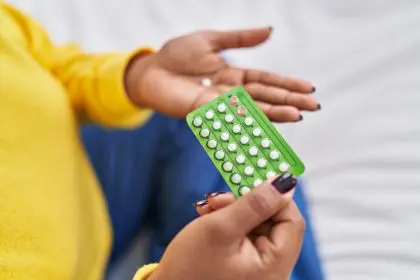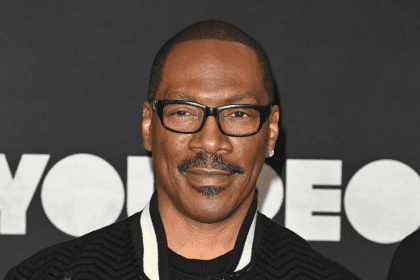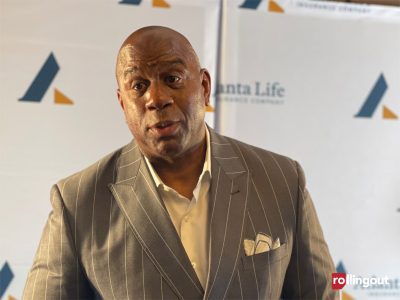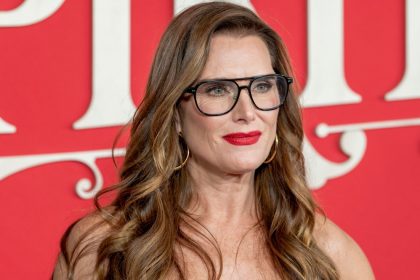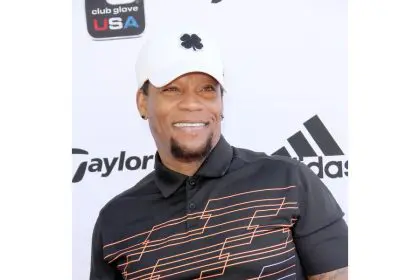
Earvin Magic Johnson’s wife, Cookie Johnson, recently appeared at Chicago’s Ritz Carlton to keynote the invitation-only “First Ladies Luncheon” with more than 150 pastors’ wives. The annual health event, sponsored by Walgreens, brings pastors’ wives together to focus on health issues that affect their congregations.
Johnson said it was important for the group to hear her side of the story, that she and Magic dated on and off for 12 years before they got married on Sept. 14, 1991. And that Magic discovered he was HIV positive one month later, and during the same week, Cookie discovered that she was pregnant. (Cookie Johnson said that Magic Johnson wasn’t sick, but that he had to take an insurance test that is required for all Lakers players, and that’s how he discovered his HIV status.)
Cookie Johnson said that what seemed an obvious role for Magic Johnson to become the public face of HIV was particularly hard for her, because it was 1991, when very little was known about the disease. “That’s what scared me most, that people would treat us like lepers,” she recalled.
During her address, Cookie Johnson spoke frankly about her personal ordeal with her HIV-positive husband, and his crusade to “save more lives.”
Here is an excerpt of her remarks:
“In late October, my husband left to play an end of the season game and I was at home with a friend of mine whose husband was also on the team. We were sitting there waiting to watch the game, and I get a phone call and it was from my husband, he said he was on his way home.
“And I said, wait a minute, the game is in Denver, why are you on your way home? And I knew then that something must have been really wrong and he said, ‘I’ll explain it to you once I get there.’
“And he came home and he took me aside and he told me, ‘I have just been told that I had tested positive.’
“At that time, everybody thought that it was just AIDS, because that’s all you ever heard. And I was like, ‘Oh my God I can’t believe that.’ And it was like your worst nightmare, and you don’t want to think that somebody is actually going to come home and tell you that.
“I was just devastated, we both were. And coming from a faith-based family and being in the church all my life, the first thing I did was just fall on the floor and start praying.
“We were crying and praying and trying to figure this thing out. Back then, when somebody said AIDS, that was a death sentence. I went straight to our Lord and I knew that God would pull us through this.
“One of the reasons that it was very hard was that earlier that week I had just found out that I was pregnant. So that was a double-whammy and we were both very scared for him and me, and not knowing if I had it or if the baby had it.
“He said, ‘I understand if you want to leave because this has happened and it’s my fault.’ I said, ‘We’re going to fight this thing together. We just got married and we’re going to figure this thing out.’
“We went to the doctor and I was negative and the baby was negative.
“We started talking to HIV/AIDS advocates…one woman had got the disease from a blood transfusion and two of her kids were infected, and she had just lost one. This woman was feisty and she determined that she was going to fight this thing and she told us, ‘you have to get out there and fight this thing. You have to be the face of it.’
“He was one of the first well-known, heterosexual people to have the disease, and back then everyone thought that it was a gay disease.
“So it was very important that he stood up and fought this disease.
“I told him that you don’t have to go out there and say anything. And he looked at me and said, ‘I have to. I have to go out there and be the face, and I have to go out and save as many lives as I possibly can.’
“It scared me to death … remember it was 1991, and people thought when you kissed, you could get the disease. Or when people hugged you, you could get the disease. That’s what scared me most, that people would treat us like lepers.
“I saw my husband’s determination in his face and that’s when I knew that that was God’s purpose for him. That he had to go out and make the announcement and work hard to save as many lives as possible.
“And I knew that my job was to support him and help him to accomplish that purpose.
“…We have to work to get rid of that stigma. In African American communities, we are very homophobic, and it’s been bred in us traditionally, I know it’s a lot of progressive people out there who are not like that, but there are a lot of us who are. And we have to start talking. If somebody gets the disease it doesn’t matter if they’re gay, young, old, whatever, we need to embrace them. We need to let them know that we love them, we care for them, and let’s talk about how we can take care of you.
“We can’t shut the door to the church and say, ‘Go away you heathens. You’ve been out there doing bad things and that’s what you get.’ We can’t do that.
“If that’s the case we will shut the door to everything and everybody.”
Photos by Bernard Williams.

